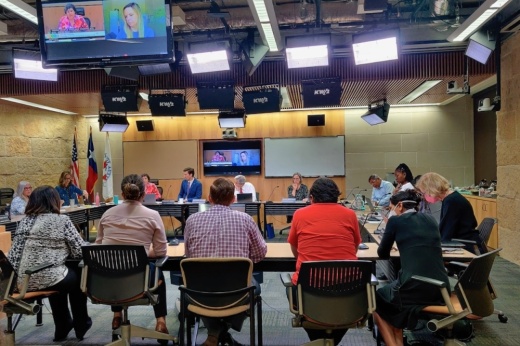In 2014, City Council and other stakeholders signed off on a recommendation tying Austin's living wage—the pay needed to secure housing, food and other needs—to annual cost-of-living increases. That policy saw the city's base wages increase in every budget from 2014 through 2018 to the current rate of $15 per hour, although gains stopped after 2018.
"After the adopted $15/hour in FY18, the City’s living wage aligned to market factors and was not adjusted," a city spokesperson said in a June 7 email. "Providing a Living Wage has been a continued priority for our stakeholders and our City staff. The recovery from the pandemic and unprecedented rising costs of living have emphasized the need to increase the Living Wage." Supporters of the new proposal to increase Austin's pay floor by more than 46% say that, despite a large, one-time jump, the city should immediately consider offering its employees $22 an hour given factors including rising unaffordability, the lingering effects of the COVID-19 pandemic and 2021's winter storm.
Carol Guthrie, business manager for the American Federation of State, County and Municipal Employees Local 1624 representing city and Travis County employees, said that continuing the earlier practice of annual wage increases could help Austin address widespread staff burnout and vacancies across city departments.
Representatives of the hospitality union Unite Here, Workers Defense Project, Laborers' International Union 1095, and Central Texas Interfaith joined Guthrie at a June 7 City Council meeting to implore officials to pursue their $22 request.
“It is time to take care of our house, to take care and restore operations to the citizens of Austin," Guthrie told council members. "We cannot do anything about inflation. We can’t do anything about what it costs to fill up your car. But the one thing we can do—that you can do—you can give your employees the wages needed to survive in this economy.”
While a final decision on the pay floor will come through summer budget discussions ending in August, five council members have already signaled their support for a resolution directing City Manager Spencer Cronk to set a $22 living wage in the city's fiscal year 2022-23 budget.
The resolution also asks for a plan to provide annual living wage increases on an ongoing basis up to $27 per hour.
“The fact of the matter is that we have to raise the wage in order to ensure that our hard-working Austinites can not only live in the city, but they can afford to have a good quality of life, and so that we can deliver the services needed as a city government," said District 2 Council Member Vanessa Fuentes, the item's sponsor. "That is the right thing to do, I think it’s the responsible thing for us to do knowing just how deep this issue is.”
District 1 Council Member Natasha Harper-Madison, who said she supports a wage increase, also said affected community members should be involved in budget discussions and related housing policy talks affecting affordability in the city.
Additionally, District 5 Council Member Ann Kitchen said it will be important to ensure continuous wage increases take place given the multi-year gap.
"If we just do the same thing that we did last time, we’re not moving the ball," Kitchen said.
Budgeting approach
City staff estimate a $22 pay floor could cost between $18.2 million and $22.8 million in the next budget.
If Cronk determines the change may not be possible this year, the Fuentes-sponsored item calls for a further cost breakdown with information on how the increase could be achieved.
Despite the plan's generally positive reception so far, a significant pay increase is not yet guaranteed. Council is scheduled to vote on the $22 measure June 16 ahead of Cronk's draft budget presentation in July.
However, several officials also noted that tighter financial conditions this year likely mean other cuts would be needed to reach a higher level, or that the full $7 per hour increase will not be feasible.
District 7 Council Member Leslie Pool said while a focus on the pay floor is important, considerations must also be made for middle-class earners at the city.
Pool and others also said staff should consider the issue of pay compression affecting employees at different experience levels who would not benefit right away from increases on the lower end of the pay scale.
Regardless of initial budget outcomes this year, District 3 Council Member Pio Renteria said the city's recent approach to wages is in need of a turnaround after the failure of broader affordability measures such as a land code rewrite.
"We have failed. We didn’t build enough housing here," Renteria said. "People are moving out of Austin. They cannot afford to live here, and these are your workers, and they’re not going to come back to Austin for no $15 an hour."





